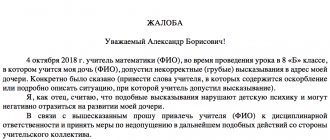Cases of insulting a student by a teacher are not uncommon today. And if earlier many turned a blind eye to this, now parents have become more competent in protecting their children.
What to do if a teacher insults a student? My son or daughter doesn’t want to go to school because of this. Let's consider what to do in such a situation.
Federal Law “On Education”
There is a law “On Education”. In particular, Article 48 states that a teacher is obliged to treat his students with respect. Respect their honor and dignity.
There is another article, number 34, which states: a student has the right to protection from mental violence and personal insult. He also has the right to respect for his dignity.
What to do if a teacher insults a student? What kind of dignity can we talk about?
What is an insult?
You need to be able to separate the wheat from the chaff. If a teacher, during personal communication with a child, said something like “Are you stupid, or something” - this is not an insult. An insult is considered a public humiliation of dignity. For example, a child wears glasses. And the teacher mocks him in front of the whole class. Then it can be considered as an insult to dignity.
What to do if a teacher insults a student? Because of appearance, poorly learned material or the wrong answer? In this case, parents must intervene.
If the conflict cannot be resolved
Most disagreements between teachers and students can be resolved peacefully. But what to do if you never came to an agreement with the teacher, and the situation only worsened?
Let's consider the main options for your actions.
Contact the administration
You can contact the school administration. But keep in mind that after a reprimand from the director, the teacher is unlikely to want to meet you halfway and establish a relationship with the child. Rather, the conflict situation will simply fade away.
Now many schools have organized a mediation service. It can include both teachers and parents with children. The purpose of this service is to help resolve complex and conflict situations between all participants in the educational space. If your school has a similar structure, you can apply there too.
Transfer your child to another class or school
If the child does not mind, there is always the option of transferring him to another class or school. But at the same time, he will have to rebuild relationships with classmates and, no less important, with teachers. Where is the guarantee that a more strict and picky teacher will not appear in the new place?
Conversation
But don’t rush to run to school threatening and screaming, as many parents like to do. Teachers are beginning to be threatened with all possible punishments. And the result is only worse for the child.
First, find out whether the teacher behaves this way with all children? Or are you just “lucky”. This is easy to do if you communicate with parents from the class. Ask them if the children complain about the teacher's behavior. You can also give it to your own child. Like, the teacher is just picking on you or scolding others too. If your child names the names of classmates who also suffer from a tactless teacher, do not be lazy to contact their parents and talk about this topic.
Does a teacher have the right to insult a student? No, of course not. But for some reason this is often forgotten, and the child is humiliated with impunity in the presence of the entire class. After parents have collected the necessary information, they can go to the teacher.
Just don’t swear as soon as you enter the office. Be polite but firm. Report that you have received information about the humiliation of a child. And you know that it is not only your son or daughter who suffers. Do you want to talk about this topic?
Very often, such a “preventive conversation” is enough for a teacher. What to do if it doesn’t help? More on this below.
When a teacher crosses boundaries
“In 11th grade, I spent a lot of time studying and preparing for the Olympiads in order to enter a university on a budget. Due to the heavy workload, I had nervous breakdowns, so I gained a lot of weight. On Saturdays, we had a physical education lesson at eight in the morning, and sometimes I skipped these classes in order to get some sleep.
One time I came to the gym, and my teacher took me to the center and began to scold me in front of the whole group for skipping classes, with the phrase: “You can skip math, but definitely not physical education.” Have you looked at yourself in the mirror lately?”
Now I’m already in my third year of university, I’ve lost a lot of weight, and I have a boyfriend, but still every time I eat too much, I remember that phrase and run to the scale. I’m constantly afraid of gaining weight, because then they might say to me again: “Have you looked in the mirror lately?” This haunts me even after four years and more than 40 hours of communication with a psychologist,” says Anna, a graduate of the Yekaterinburg gymnasium.
Because of the teacher's criticism, the child runs the risk of becoming unsure of himself or doubting the correctness of his choice.
“I have been swimming since the first grade and always dreamed of becoming an athlete, so in the 11th grade, when choosing a university, I had no doubt that I would go into physical education. When applying, it is more important to provide good results in swimming, rather than excellent Unified State Exam scores, so I devoted more time to training.
One day, the class teacher decided to have a conversation with me in a raised tone about the fact that I still wouldn’t make a great athlete and I wouldn’t be successful in swimming. She asked me to study and discard “stupid” thoughts about swimming. I hated school because she said this to me every time we saw her, so I turned to a psychologist.
Now I’m going to the Russian Championship and I’m very glad that then her words didn’t break me and didn’t force me to give up my dream. But many of my friends, to whom teachers told the same thing, alas, listened to the “good” advice and went to study in other specialties,” says Dmitry, a graduate of the Chelyabinsk school.
Some teachers try to deal a painful blow to children's self-esteem.
“I dreamed of becoming an architect, so in the 11th grade I definitely decided that I would take specialized mathematics at the Unified State Exam. However, my teacher laughed out loud after I told her about this and said that I was unlikely to be able to pass even the basic level.
At first, I decided not to pay attention to her ridicule, but she took the tests in specialized mathematics from me and gave me the basic version on “samples”, did not tell me about the postponement of elective classes, and right on the day of the exam she wished me at least a minimum score. I burst into tears right at the entrance to the school - my hands were literally shaking from fear of not passing.
In the end, I managed to score 88 points (the average passing score is 50), but I still consider myself weak in this subject. At the university, during mathematics classes, I try to sit in the back desks so as not to go to the blackboard,” says Violetta, a graduate of the St. Petersburg school.
We are writing a complaint
A complaint against a teacher is written to the director. This is the very first step in protecting your child. Before contacting the appropriate authorities, notify the school principal about the teacher’s misconduct.
In your appeal, list in detail all the facts indicating a violation of the child’s rights to respect for honor and dignity. And demand that action be taken against the teacher.
Just be careful: the teacher can present the situation in such a way that your offspring turns out to be a slanderer. And your appeal will be nothing more than a slander against the teacher.
The ideal option is a collective complaint against the teacher. The more parents sign it, the higher the likelihood that the unscrupulous teacher will be held accountable.
Thirty days are given for the trial. During this time, the director conducts an internal investigation and gives parents a written response.
The appeal is drawn up in two copies. One is registered and submitted to the director for consideration, and on the second a note is made about the incoming complaint number with the date of its filing. Who should do this? Of course, the school secretary.
Obedience Lesson
Does this mean that shouting and bickering will cost the parent of an ill-mannered child a tidy sum? Not certainly in that way. Deputy Yuri Volkov, one of the authors of the innovation, reassures: they will be fined only if the student’s behavior directly interferes with the teacher’s professional activities.
There are many such sad school stories. “I and the Association of Trade Unions of Russia “SOTSPROF” have repeatedly received appeals from representatives of the teaching community about the problem of bullying of teachers,” says the State Duma deputy. His words are confirmed by self-explanatory figures from an extensive sociological study: every second teacher surveyed has been a target of bullying at least once while at his workplace.
But how can you figure out in a conflict situation where the ill-fated bullying is and where is simple disobedience? The deputy suggests looking at social networks: every violator always has a friend who will record the “feat” on video and post it on the Internet. And here any questions really disappear.
After all, if indignation in response to a remark can only distract the teacher, then putting a bucket on his head will certainly prevent him from fulfilling his main task - giving knowledge. It was the trash can that he decided to put on his teacher’s head while she was writing an assignment on the board, the hero of one of the videos on YouTube.
Further more: in response to justified indignation and the intention to expel the student who was interfering with the lesson, the teacher was threatened: “I’ll tell you now...”... Since the newspaper can be read by children, it is impossible to continue the phrase said by the child in class.
Another video is full of threats and obscenities, and has received almost 2 million views. A high school student, literally hovering over the teacher, who is huddled in her chair, reads her with choice words, and when she tries to call the head teacher to come to her help, the guy promises to steal her phone.
Alexandra Timakova, a teacher and part-time coach for teachers, says that one should not be surprised by such egregious and already regular cases. According to the methodologist, children only mirror the behavior and attitude of their parents towards their teachers: “If a child hears talk about how “the teacher is a fool” and “I’ll give her a hard time - how dare she give my genius a bad mark?”, he is unlikely to experience anything. something else towards teachers, besides contempt.” In addition, “it has almost become a norm that a petition from one parent addressed to the administration or even the Ministry of Education is a reason for dismissing a teacher,” states Alexandra, regretting that “in the last decade the parent community has shown simply an unprecedented scale of hatred to the education system in general and to teachers in particular.” It seems that teachers have to protect themselves from two sides: not only from students, but also from their parents.
The parents themselves are adamant and place responsibility on teachers, because they are “older and should be wiser in conflict situations.” This is the opinion of Roman, whose youngest daughter studies at an elite Moscow school, declaring that “first of all, the teacher is always to blame, since it is his task to become a teacher and teach the child not only formulas, but also social rules and norms of behavior.” And of course, he disagrees with the system of fines for parents whose child is rude to the teacher: “this is wrong, because the teacher’s tasks do not have the option of a punitive function.”
Psychologists with whom RG - Nedelya spoke also do not see the effectiveness of the fining system in resolving teacher-student conflicts. They are ready to offer their own, more neutral measures. Anna Bogdanova, a school and adolescent psychologist, gives an example of an educational institution where she worked: there is a school mediation service there. “The help of such specialists came to the rescue even in a difficult situation, when one of the teachers had a conflict with the whole class!” - says Anna.
What should a teacher do if he is insulted and humiliated, and at the same time there is no such magical place at school where he can take a breath and calm down the troublemaker? The recipe from Anna Bogdanova is quite clear: “He needs to be flexible, because the profession of a teacher still implies that a person must love children, and therefore be able to choose the right approach to everyone.” And in some cases you need to approach the issue with humor, advises the psychologist. “It’s another matter if a teacher is not in a resourceful state, he has professional burnout, he feels morally bad, then, of course, what kind of humor is there. Therefore, teachers need to monitor their psychological state and, if necessary, turn to specialists,” concludes Anna.
Be that as it may, as the project developers told RG, they plan to submit the initiative to the State Duma in the near future.
Direct speech
Victoria Danilchenko, lawyer and host of the television program “On Minor Affairs”
“Cases when schoolchildren actually cross all boundaries and drive teachers to the brink are rare, but even in relation to them, the introduction of the measures proposed by deputies will be not only ineffective, but also harmful. After all, a fine for a parent is unlikely to be a lesson for a child. In fact, his behavior will remain unpunished. And punishment for misconduct must come. Of course, the school has no right to use physical punishment or use a belt. But on the other hand, he can find some kind of socially useful work for the offender - being on duty in the classroom, washing floors in the hallway. A real teacher is able to correct even the most inveterate hooligan much better than any law enforcement officer. But in order for children to be able to listen to teachers, it is important to increase the prestige and authority of the teaching profession. Both the state and society should take part in the formation of such an image, this includes increasing the level of wages, reducing the workload, and instilling respect for teachers among the younger generation.
Contact RONO (UNO)
There, teachers will be held accountable for insulting students. Parents write an application to RONO or UNO. This organization has different names in different cities. If the child is old enough (8th grade or older), he can write a complaint on his own behalf. Thus, both the parents and the student will complain.
Please note that an appeal to RONO is written in the event that the director has left everything to chance. The teacher who violates the rights of the child and the director who turned a blind eye to the situation will be held accountable. It may come down to dismissal.
Court or prosecutor's office
If the proceedings against the teacher do not reveal any violations in his behavior, and the children continue to complain, there is nothing left to do but go to court. Or complain to the prosecutor's office. Just remember that one statement is not enough here. More solid evidence is needed. What could it be?
- An audio recording in which a teacher can be heard humiliating a student or students. Everything can be recorded on a voice recorder without the teacher knowing.
- Video recording. You won't be able to make a video unnoticed. And a child who is humiliated will not have time to do this. His classmates can help him. The teacher starts to humiliate? Someone is filming this.
If a teacher insults a student, the article will punish him for it. This is an administrative offense, no less. But only if the victim provides compelling evidence.
Causes of conflicts between students and teachers
As a rule, conflict does not arise out of nowhere. It is always based on a clash of interests and opposing positions.
The peculiarity of school conflicts is that the teacher cannot always understand the depth of the child’s experiences, and the student himself cannot cope with his emotions.
According to a study conducted by the Russian Academy of Education in 2022, 76.8% of students reported conflicting relationships with teachers.
Psychologists identify three groups of reasons that can lead to disagreements between a teacher and a student.
"Educational" reasons
The first group is reasons related to educational activities.
Teachers may not be satisfied with:
- low academic performance;
- failure to complete homework;
- the student's lack of interest in the subject.
In turn, students are often dissatisfied:
- unfair assessments;
- unclear explanation of the material;
- complex and voluminous homework;
- insufficient competence of the teacher (lack of experience and deep knowledge in the subject).
“Role” reasons (behavior in society)
The second group is reasons related to role relationships at school.
A conflict with a teacher can be provoked by:
- lack of discipline among students;
- disregard for school rules;
- protest actions “in public”.
Teachers also often “sin”:
- authoritarianism;
- restricting the freedom of students (for example, they are not allowed to leave the classroom during a lesson);
- an open demonstration of his superiority and power over schoolchildren.
Personal reasons
The third group is personal reasons. These include:
- personal characteristics of the teacher and student that provoke a conflict situation: aggressiveness, irritability, rudeness, etc.
- stress, personal or family problems of a teacher or student that interfere with full-fledged educational activities;
- discrepancy between the intellectual capabilities of the child and the requirements placed on him by the teacher;
- lack of respect, goodwill and communication culture on both sides of the conflict;
- the teacher’s assessment of the child not by his personal qualities, but by the marks in the diary.
Thus, the conflict between student and teacher is not just a conflict of generations. A clash of interests occurs in the process of educational activities and affects the personal interests of each participant in the conflict.
Teacher's responsibility
What should a teacher be like? Competent, kind and respectful towards their wards. In the old days there were such teachers. And now there are fewer and fewer of them. A teacher is capable of lashing out at a child because of a bad mood or humiliating him because of his appearance or unprepared homework.
If his guilt is proven, the teacher will be held accountable. What could it be like?
- Disciplinary. After a trial, the director or RONO has the right to dismiss a teacher who indulges in a boorish attitude towards children.
- Administrative. A harmful teacher will have to pay a certain amount for humiliating a student. From 10,000 to 30,000 rubles. This is an administrative fine for insulting the honor and dignity of a child.
- In addition, the parents of the victim have the right to demand compensation for moral damage in court. And its size is announced by them themselves in this case.
What to do if a child is bullied by a teacher at school?
All of the above related to working with one specific teacher. If there are several such teachers, then this does not change the essence of your actions, and each of the teachers must be dealt with separately.
So the algorithm is very simple. First, you find out the circumstances of the child and, based on your conversation with him, draw conclusions about how much this situation requires you to go to school. After all, if you are scolded for lack of homework, then it is much easier and more useful to start monitoring its completion.
If everything is more complicated, then contact the teacher with a request to clarify the situation. You shouldn’t start with accusations - it’s better to express your concern for the fate of your child. By the way, it is advisable to do this at least once a month, even without special reasons.
If the conversation with the teacher is unsuccessful, then seek the support of a psychologist or administration to look into it more seriously. Listen and take note of their demands and comments about your child's behavior, but remember that your goal now is to protect him.
After talking with the administration and the offending teacher, you can only take an interest in the child’s affairs at school and control those aspects of his school life for which you are responsible: homework, appearance, attendance and behavior at school.
What if the student is at fault?
We looked at several options for how parents can act if their child is insulted by a teacher. What if it's the other way around? The student insulted the teacher, what punishment will he suffer for this?
Several options for the development of the situation are possible:
- Independent problem resolution by the teacher.
- Appeal to parents.
- Appeal to the courts demanding compensation for moral damage.
Experienced teachers recommend dealing with the situation yourself. Children these days are such that they don’t give a damn about teachers. They are well aware of their rights, but they forget about their responsibilities.
The teacher can:
- Let the insult fall on deaf ears.
- Leave the bully after class and give him a moral beating.
- Turn the situation around in such a way that the student who allowed himself to offend the teacher looks for a way out of it.
- Boycott the student.
- Start underestimating.
The last moment is not one of the best. But sometimes the teacher has no other choice. For example, a child is very arrogant. But he studies well, and the teacher knows that he is scolded for bad grades. Earned a “four”? Put "three". If you want, you can find fault with everything.
Complaining to parents is not always beneficial. Today's children do not particularly value the work of teachers. Parents quickly take the side of their beloved children. If the teacher understands that the parents are adequate, you can call them to school for a conversation.
The court is a last resort. If there is no government for a child, he himself is constantly rude, his parents protect and support him, there is no point in going to the director. You just need to be prepared for the fact that you will have to leave your job after the trial.
Types of bullying
Teacher bullying can be expressed in many ways. To the already favorite methods in the form of open conflicts, psychological pressure and ignoring, shaming has been added - public humiliation or shaming. Today, people find it difficult to hide their personal lives due to the presence of social media. Everyone remembers the 2022 story about a teacher from Omsk and her pictures in a sports swimsuit - that case was widely publicized, and many stood up for the woman. However, just recently, in January of this year, a similar incident occurred in Ulyanovsk, where a teacher was harassed for going to a lingerie store - students noticed her in a shopping center and filmed her. The initiator of the bullying was one of the parents, who demanded that the girl be fired from the school:
“How can she go and choose her underwear, knowing that her own students can see her? It’s good that at least she didn’t go try it on in front of them.”
Another recent case comes from Bryansk: there, a young teacher-trainee posted an Instagram story with a girl, calling her his wife. She subsequently explained that it was a joke:
“I currently live with my girlfriend, but as neighbors. She has a child, and since I come home from work earlier, the child, of course, is well-groomed and looked after. We have a lot of photos, we celebrate the holidays together. And in one of the New Year’s videos I call my friend my wife. Well, it’s clear that since we live together, we have some nicknames. We jokingly call each other that.”
Parents criticized the girl, the school management announced the termination of cooperation
And this is far from the worst thing a young specialist can face. It’s much worse for those who come under attack from students. Some children do not shy away from openly putting pressure on teachers. According to statistics, 2/3 of teachers have experienced name-calling and contempt. For example, like in this video:
The problem is widespread in society, but, unfortunately, it is not customary to talk about it out loud. This once again undermines the already low interest in the profession. Workers in the field will also not gain authority from voicing the issue. However, admitting mistakes will help solve them. Ignoring it can lead to a situation that a reader told us about:
“At my school there was an overly elderly Trudovik. Guys from all parallel classes were driven to his lessons. It so happened that the “B” class (I was in “A”) was not devoid of “especially gifted” who in every possible way asserted themselves against its background. The favorite method was spitting in the back. They literally spat on him, and due to his age, he didn’t even see it. As a result, he could walk like this all day long, until other teachers paid attention to it and wiped away the consequences of degenerate pleasures. That's not all. Particularly redneck representatives of the school “elite” often sent him away and cursed him. When his nerves could not stand it, they could throw a chair at him or push him. One even started to fight. Now, years later, it’s a shame that an adequate portion of the students did nothing about it (myself included).”
Obviously, the teaching staff knew about the students’ antics. But if the bullying continued time after time, it means that no one took effective methods to combat bullying.










